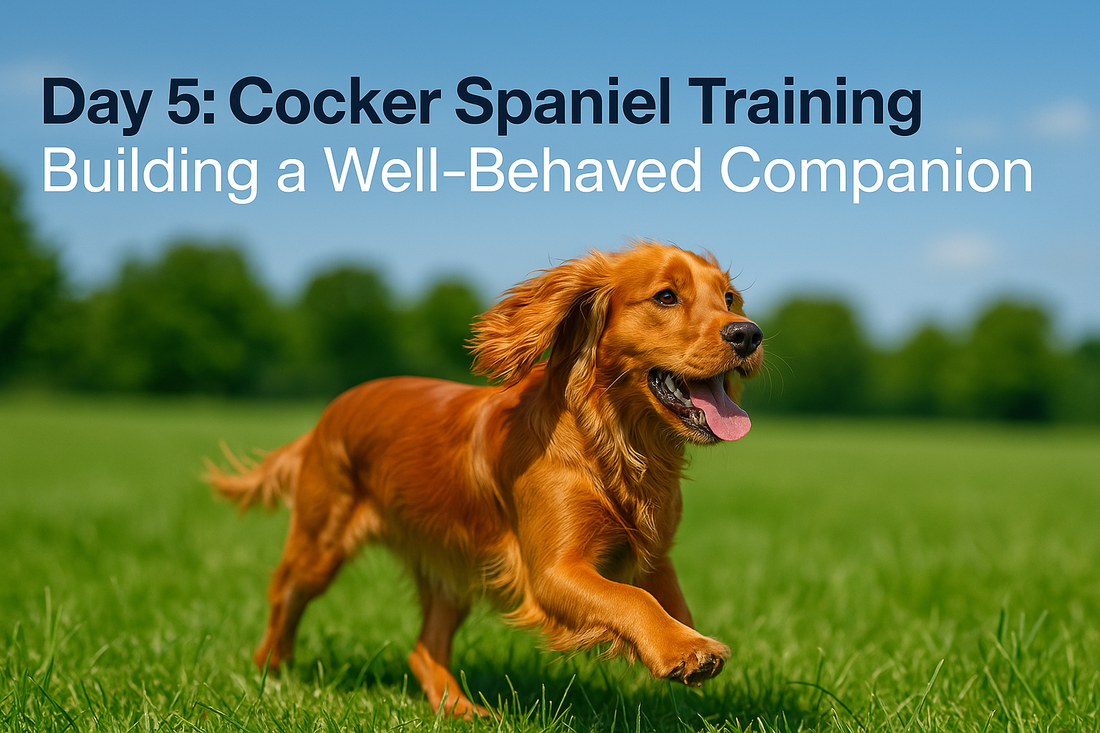We’ve stretched legs and wagged tails through exercise and health in the past few days, but today, it’s time to tackle one of the biggies: training. Now don’t panic—this isn’t about military drills or expecting your Cocker Spaniel to make your morning coffee. Training is simply about helping your dog understand the world, and how to be a good pup within it.
Cocker Spaniels are smart, affectionate, and always keen to please (especially if food is involved). With a bit of know-how, a lot of treats, and just the right dash of patience, training can actually be a fun bonding experience.
Let’s dive in!
---
1. Positive Reinforcement: Because Who Doesn’t Like a Biscuit?
This is the golden rule: reward what you want to see more of. Whether it’s sitting politely, coming when called, or just not launching themselves at the postie—reward, reward, reward.
Be quick on the draw – Give that treat or praise the second they get it right.
Mix it up – Treats, belly rubs, a joyful “YES!”—variety keeps them engaged.
Ease off the snacks over time – Eventually, a “good dog!” will go a long way (but they’ll always hope for chicken).
---
2. Early Socialisation: The More the Merrier
A well-socialised Cocker Spaniel is a confident one. Exposing your pup to a wide range of experiences early on helps prevent fear or anxiety down the line.
New faces, places, and paws – Meet friendly dogs, hear different sounds, walk on different surfaces.
Take it slow – A big world can be overwhelming. Keep it fun and positive.
Watch their body language – If they’re unsure, give them time to adjust. It’s not a race.
---
3. Consistency & Patience: Your Two Best Friends
If you ask for a “sit” one day, and “park your bum” the next, your Spaniel’s going to be confused. Keep commands clear and consistent.
Short and sweet – Five-minute training bursts throughout the day work wonders.
Stick to routines – Dogs thrive on structure, and Cocker Spaniels especially love knowing what’s next.
Patience, always – Some days they’ll nail it. Other days they’ll forget what a “sit” is. That’s okay. Keep going.
---
4. Recall Training: Come Back Here, You Fluffy Rascal
Off-lead freedom is brilliant, but only if your pup comes back when called. It’s a must for safety—and your peace of mind.
Start small – Garden, hallway, somewhere secure.
Use the good stuff – Think roast chicken, not dry kibble. Make it worth their while!
Always praise them – Even if they took the scenic route via a squirrel. You want them to want to come back.
---
5. Mental Stimulation: A Busy Brain is a Happy Spaniel
Cocker Spaniels are thinkers. Give them nothing to do, and they’ll find something (usually involving socks or flowerbeds).
Puzzle toys and sniffing games – Great for rainy days or while you work from home.
Trick training – Roll over, spin, even clean up toys (yes, really!)—they’ll love the challenge.
Variety is key – Keep things interesting with new smells, toys, and routes.
---
6. Handling the Hiccups: Barking & Separation Woes
No dog is perfect (even if they look like it when they’re asleep). Here’s how to handle two common Cocker quirks:
Barking:
Identify the trigger – Doorbell? Birds? The wind? (Yes, some will bark at the wind.)
Teach a “quiet” command – Reward silence, not just noise.
Limit exposure to triggers – Curtains, calming music, and a bit of training magic go a long way.
Separation Anxiety:
Start small – Pop out for 5 minutes, then 10, then a short walk. Build their confidence.
Keep arrivals/departures low-key – No drama, no long goodbyes. Just cool and casual.
Create a comfy space – Toys, blankets, and something that smells like you.
And remember, if it ever feels like too much, there’s no shame in calling in a professional dog trainer or speaking to your vet. We’ve all been there.
---
Your Daily Training Plan (No Overwhelm Here)
Morning:
Obedience practice for 5–10 minutes (sit, stay, recall), followed by a walk with a bit of socialisation.
Midday:
Mental enrichment—puzzle toy, snuffle mat, or a little trick session.
Evening:
Review commands, work on behaviour (e.g. barking), then cuddle up and wind down with some play.
---
In a Nutshell…
Training your Cocker Spaniel isn’t about creating a robot dog. It’s about learning together, building trust, and making life easier and more fun—for both of you. Yes, there’ll be moments where they seem more interested in a fly than your voice, but there’ll also be pure joy when they sit, stay, or come zooming back with a happy tail wag.
You’ve got this.
Join us tomorrow for Part 6, where we’ll chat about the practical side of Cocker Spaniel ownership—grooming, routines, and a few things they don’t tell you in the puppy books!

